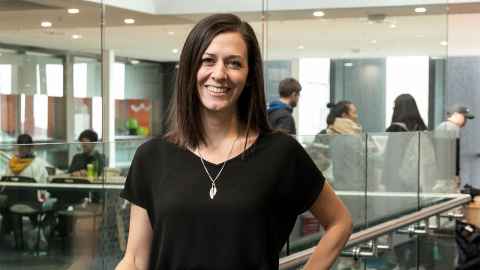Doctoral study in Software Engineering
Why study with us?
- The highest-ranked engineering faculty in New Zealand (QS World University Rankings by Subject, 2021)
- Opportunities to be supervised by experts in the field, such as world-class researchers in the areas of Human Aspects of Software Engineering, Parallel and Reconfigurable Computing, and Software Engineering for Robotics
- Connections to professional, industry and research organisations, including the Association of Computing Machinery (ACM) and Software Innovation New Zealand
- Access to Postgraduate Research Student Support (PReSS) funding for research expenses
Research opportunities
Pursuing a PhD at our University gives you access to a high-calibre research community – you may have the opportunity to publish papers, attend international conferences, and develop your network in academia and industry.
We welcome research proposals in topics relating to our key areas, including:
- Human and social aspects of software engineering, with emphasis on the people involved in software development processes, including studying ways to improve coordination on software teams, improving comprehension of software programs, and devising novel techniques to help software developers understand what users want from the software.
- Software testing, which involves studying the ways to improve the verification of software systems, such as non-determinism in testing (test flakiness), test oracle generation/improvement, automated software testing, and testing of concurrent software programs.
- Machine Learning for software engineering, focusing on best practices in designing and developing software solutions with machine learning algorithms at the core.
Applied Machine Learning, including designing systems for autonomous vehicles, intelligent and automated health care systems, automatic speech recognition for the speech impaired, and speaker identification and verification. - Parallel and reconfigurable computing, including task scheduling for parallel systems, reconfigurable computing with FPGAs, reliability in scheduling, and design of novel scheduling algorithms.
- Software security, including examining novel approaches for the mitigation of attacks in Cyber-Physical Systems (CPS), such as medical devices and smart grids.
Digital educational engineering to improve student learning by applying the software engineering process with the latest technologies, including machine learning, virtual reality, augmented reality, and more. - Software engineering for robotics, including improving software tools and processes for robotic drivers and speech systems.
Our people

Dr Kelly Blincoe is an expert in the human aspects of software engineering. Her research focus is on collaborative software development. She studies software dependencies and the resulting coordination needs between software developers. She was awarded a Marsden Fast Start grant to investigate new techniques to automate software dependency updates, which can enable more secure software products. She also does research in software requirements engineering and diversity and inclusion on software teams. Kelly is a leader in the International Software Engineering research community. She is an Associate Editor of the IEEE Transactions on Software Engineering, the Empirical Software Engineering Journal, and the Journal of Systems and Software. She serves on the executive committee of Software Innovation New Zealand and is the Diversity, Inclusion, and Belonging co-chair for the ACM’s Special Interest Group on Software Engineering.
More experts in Software Engineering:
Past research topics
- Task Allocation in Agile Software Development Teams | Supervised by Dr Kelly Blincoe and Dr Rashina Hoda
- Automated software test oracle | Supervised by Dr Reza Shahamiri
- Cloud Computing with Annotation Parallel Task (@PT) | Supervised by Associate Professor Oliver Sinnen and Dr Nasser Giacaman
- Program Comprehension Challenges Detection For Pull Requests With Machine Learning | Supervised by Dr Kelly Blincoe
- Deep Neural Network-based Speaker Identification | Supervised by Dr Reza Shahamiri
- Optimal Task Scheduling for Parallel Systems using State-Space Search | Supervised by Associate Professor Oliver Sinnen and Dr Avinash Malik
- Formal Methods for functional Safety of Industrial Automation Systems | Supervised by Professor Partha Roop
- Robot application programming interface and language design | Supervised by Professor Bruce MacDonald, Dr Beryl Plimmer, and Professor John Hosking
Scholarships and awards
There are several scholarships you may be eligible for when you decide to pursue your PhD in Operations Research, including the University of Auckland Doctoral Scholarships.
Help and advice
For general student enquiries, please contact the Student Hubs.
If you would like to find out more about studying Software Engineering, you can contact a Postgraduate Adviser.